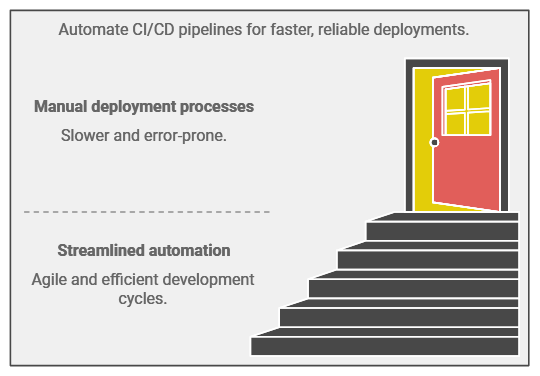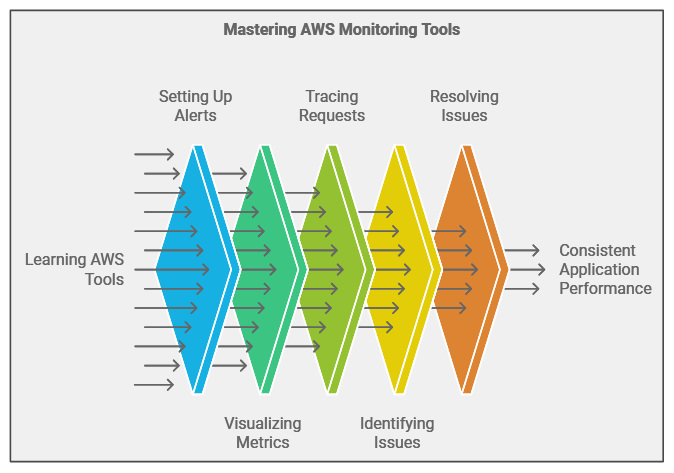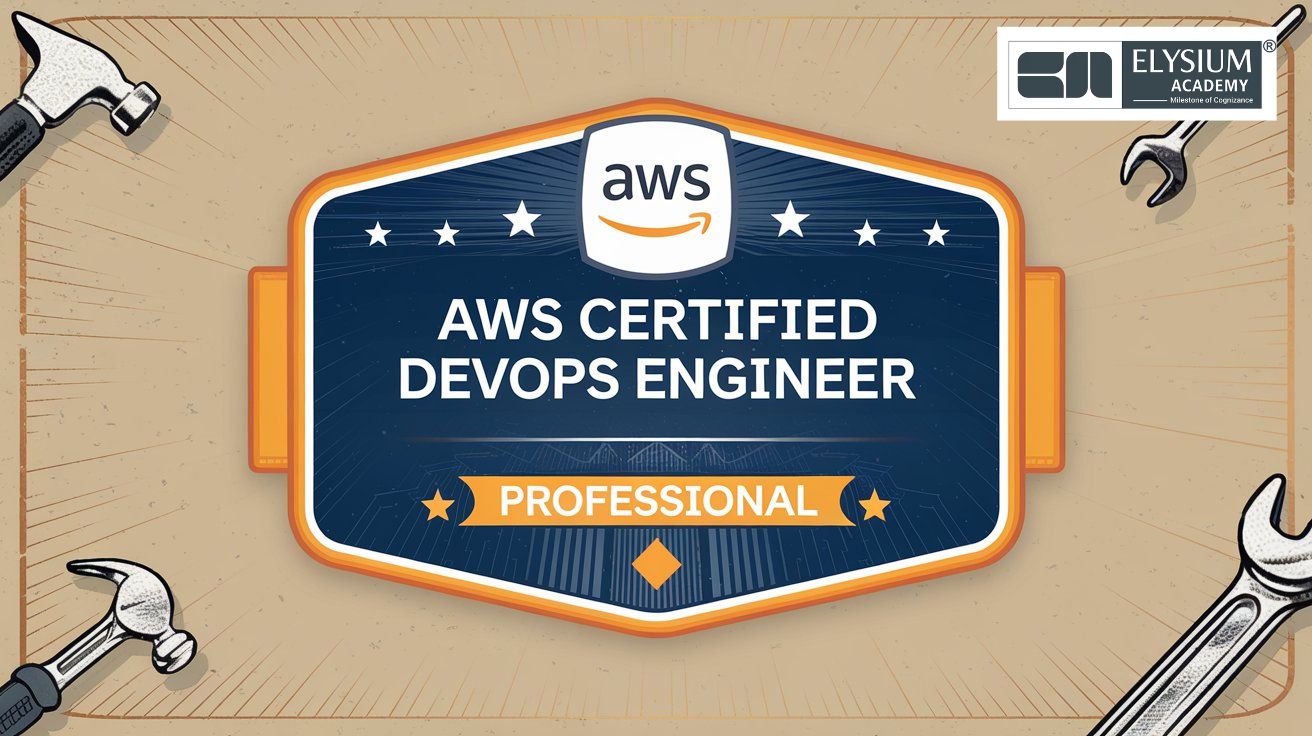The demand for DevOps professionals is soaring as companies embrace automation, cloud computing, and continuous integration and delivery (CI/CD) practices to streamline their software development and deployment processes. However, DevOps isn’t without its challenges, particularly when scaling operations, ensuring security, and managing complex infrastructure. That’s where the AWS DevOps Engineer Certification comes in. This certification from Amazon Web Services (AWS) equips professionals with the skills and knowledge to tackle the unique challenges faced in DevOps, making it a valuable asset for anyone pursuing a career in this field.
In this article, we’ll explore the key challenges in DevOps and how the AWS DevOps Engineer Certification, offered by Elysium Academy, can help you master the tools and strategies to overcome these obstacles.
Challenge 1: Managing Complex Infrastructure
The Challenge
As organizations grow, so do their infrastructure needs. Managing complex, multi-tiered, and often distributed systems can be overwhelming, especially when dealing with various services, databases, and applications. Manual infrastructure management is time-consuming, prone to human error, and difficult to scale.
How AWS DevOps Engineer Certification Solves This
The AWS DevOps Engineer Certification teaches you Infrastructure as Code (IaC) techniques using AWS CloudFormation, allowing you to define and provision infrastructure with code rather than manual processes. You’ll learn to use tools like AWS OpsWorks and AWS Elastic Beanstalk for automated deployment, configuration, and scaling, significantly reducing the complexity of managing large-scale infrastructures.
Challenge 2: Implementing Continuous Integration and Continuous Delivery (CI/CD)
The Challenge
Implementing effective CI/CD pipelines is one of the cornerstones of DevOps. However, setting up these pipelines requires knowledge of automation tools, version control, testing, and deployment processes. CI/CD aims to streamline the process of code integration and delivery, but achieving this seamlessly without interrupting workflows is challenging.
How AWS DevOps Engineer Certification Solves This
The AWS DevOps Engineer Certification covers AWS CodePipeline, AWS CodeBuild, and AWS CodeDeploy, enabling you to set up automated CI/CD pipelines that support faster and more reliable deployments. By learning to automate the build, test, and deployment stages, you’ll minimize errors and increase the speed of delivery, allowing for more agile and efficient development cycles.

Challenge 3: Ensuring Security and Compliance
The Challenge
Security is a top priority in DevOps, as continuous deployment can expose vulnerabilities if not properly managed. DevOps teams face the challenge of maintaining stringent security and compliance standards without slowing down the development process. This includes managing access control, data encryption, and monitoring for unusual activity across various environments.
How AWS DevOps Engineer Certification Solves This
The certification equips you with tools like AWS Identity and Access Management (IAM), AWS CloudTrail, and AWS Key Management Service (KMS) to enhance security and compliance. You’ll learn to implement least-privilege access control, manage and rotate encryption keys, and track changes to your environment. This allows you to maintain high security standards while delivering at a faster pace, ensuring both compliance and risk mitigation.
Challenge 4: Scaling Applications Effectively
The Challenge
In today’s global marketplace, applications need to handle fluctuating loads without compromising performance. Scalability is a significant challenge in DevOps, requiring an infrastructure that can automatically adjust based on demand. Without proper scaling mechanisms, applications can experience downtime, reduced performance, and user dissatisfaction.
How AWS DevOps Engineer Certification Solves This
With AWS Auto Scaling and Amazon Elastic Load Balancing (ELB), the AWS DevOps Engineer Certification provides you with tools and techniques to design scalable applications. You’ll learn to set up automatic scaling policies that adjust resources according to traffic patterns, ensuring optimal performance and cost efficiency. This knowledge is essential for maintaining high availability and responsiveness in dynamically changing environments.
Challenge 5:
Handling Configuration Management
The Challenge
Managing configurations across multiple environments can be difficult, especially when each environment has unique settings. Manual configuration changes are error-prone and hard to track, increasing the risk of inconsistencies and downtime.
How AWS DevOps Engineer Certification Solves This
AWS DevOps certification emphasizes the use of configuration management tools like AWS Systems Manager and AWS OpsWorks, which allow you to automate and standardize configurations across environments. This reduces the likelihood of errors and makes deployments more predictable, saving time and improving consistency. By learning these techniques, you’ll streamline configuration processes and minimize operational overhead.
Challenge 6: Monitoring and Logging
The Challenge
Continuous monitoring and logging are crucial in DevOps for tracking application performance, identifying issues, and gaining insights into infrastructure health. However, monitoring across distributed systems and interpreting logs from various services can be a complex task.
How AWS DevOps Engineer Certification Solves This
The certification program teaches you to use Amazon CloudWatch and AWS X-Ray for comprehensive monitoring and logging. You’ll learn how to set up alerts, visualize metrics, and trace requests across microservices, helping you identify and resolve issues promptly. Mastering these tools allows you to maintain consistent application performance and proactively manage any potential disruptions.

Challenge 7: Cost Optimization
The Challenge
Managing costs is a continual challenge for DevOps teams, particularly when working with cloud infrastructure. Without proper cost management, companies can quickly accumulate high expenses due to unused resources, inefficient infrastructure, and lack of visibility into spending.
How AWS DevOps Engineer Certification Solves This
AWS offers a range of cost-management tools like AWS Cost Explorer, AWS Budgets, and AWS Trusted Advisor. Through the AWS DevOps Engineer Certification, you’ll learn to implement cost-saving practices such as right-sizing instances, using reserved instances, and setting up budget alerts. This enables you to optimize cloud spending while still meeting performance and availability goals, making you an asset to any organization aiming to balance cost with innovation.
Additional Benefits of AWS DevOps Engineer Certification
Beyond addressing these specific challenges, the AWS DevOps Engineer Certification offers a range of broader benefits for DevOps professionals:
- Comprehensive Knowledge: AWS provides a complete suite of DevOps tools, so mastering these through certification gives you a well-rounded understanding of the DevOps lifecycle on a cloud platform.
- Career Advancement: With the demand for cloud-savvy DevOps engineers on the rise, having an AWS certification can significantly enhance your career prospects and earning potential.
- Enhanced Productivity: Learning how to automate processes, configure systems, and optimize costs allows DevOps teams to work more efficiently, delivering faster results with fewer errors.
- Networking Opportunities: AWS certifications also open doors to a community of certified professionals, forums, and AWS-specific events where you can connect with like-minded individuals.
Checklist for Success with AWS DevOps Engineer Certification
To make the most of the AWS DevOps Engineer Certification, follow this checklist for a successful journey:
- Assess Your Current Skills: Identify any gaps in your knowledge, especially around core AWS services and DevOps practices.
- Take Foundational Courses: Consider starting with AWS Certified Cloud Practitioner or AWS Solutions Architect to build a solid AWS foundation.
- Practice Hands-On Labs: Use the AWS Management Console and AWS CLI to set up real scenarios, like creating CI/CD pipelines or configuring auto-scaling.
- Learn Infrastructure as Code (IaC): Familiarize yourself with AWS CloudFormation or other IaC tools like Terraform, as they’re essential for managing infrastructure at scale.
- Set Up CI/CD Pipelines: Practice creating CI/CD workflows using AWS CodePipeline, CodeBuild, and CodeDeploy to master the automation process.
- Understand Security Best Practices: Dive into AWS IAM, KMS, and CloudTrail to get comfortable with AWS’s security offerings.
- Use Monitoring and Logging Tools: Get hands-on experience with Amazon CloudWatch and AWS X-Ray to monitor applications effectively.
- Implement Auto Scaling and Load Balancing: Set up and test scaling policies and load balancing configurations in AWS to ensure reliable performance.
- Track and Manage Costs: Regularly use AWS Cost Explorer and set budget alerts to keep cloud spending under control.
- Take Practice Exams: AWS practice exams can help you identify weak areas and familiarize yourself with the certification format.
- Join AWS Communities: Engage in forums and study groups with other AWS certification aspirants to exchange knowledge and tips.
- Schedule Your Certification Exam: Once you feel confident, register for the AWS DevOps Engineer exam and ensure you’re well-prepared.
Frequently Asked Questions (FAQs)
1. Why is the AWS DevOps Engineer Certification valuable?
The AWS DevOps Engineer Certification is recognized globally and equips you with in-demand skills to tackle key DevOps challenges on the AWS platform. It opens up career opportunities and increases your marketability as an AWS-certified professional.
2. Is prior AWS experience required?
While prior AWS experience isn’t mandatory, it’s beneficial to have a foundational understanding of AWS services. Starting with certifications like AWS Certified Cloud Practitioner can provide a good base.
3. What career opportunities are available after completing the certification?
This certification prepares you for roles such as DevOps Engineer, Cloud Engineer, and Site Reliability Engineer, with opportunities to specialize in cloud automation and infrastructure management.
4. How long does it take to prepare for the AWS DevOps Engineer exam?
The preparation time depends on your existing knowledge, but on average, 2–3 months of dedicated study and practice is sufficient.
5. Are AWS DevOps skills relevant to other cloud providers?
Yes, while the certification focuses on AWS, many skills (like CI/CD, automation, and infrastructure management) are transferable to other cloud platforms like Azure and Google Cloud.
Conclusion
DevOps is pivotal for organizations looking to streamline software development, enhance deployment speed, and maintain system reliability. Yet, DevOps practices come with their own set of challenges, from infrastructure complexity to ensuring continuous security and cost control. The AWS DevOps Engineer Certification provides professionals with the essential tools, skills, and knowledge to address these challenges, making it an invaluable credential for any DevOps career path.
With Elysium Academy AWS DevOps Engineer Certification training, you gain practical, hands-on experience with AWS’s suite of DevOps tools, from configuring CI/CD pipelines to automating infrastructure management. This certification doesn’t just enhance your skillset; it makes you a valuable asset in a world increasingly reliant on cloud solutions and automation. By earning the AWS DevOps Engineer Certification, you’ll be equipped to solve critical DevOps challenges and lead your team toward greater efficiency and innovation.
Ready to master the complexities of DevOps? Enroll in Elysium Academy AWS DevOps Engineer Certification course and set yourself up for a rewarding, future-proof career in cloud computing and DevOps!













